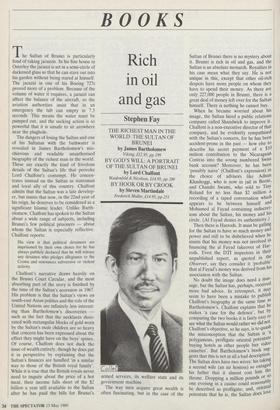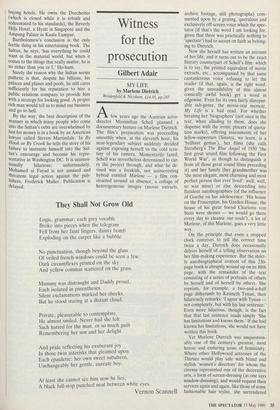BOOKS T he Sultan of Brunei is particularly fond of taking
jacuzzis. In his fine house in Osterley the jacuzzi is set in a semi-circle of darkened glass so that he can stare out into his garden without being stared at himself. The jacuzzi in one of his Boeing 727s proved more of a problem. Because of the volume of water it requires, a jacuzzi can affect the balance of the aircraft, so the aviation authorities insist that in an emergency the tub can empty in 7.5 seconds. This means the water must be pumped out, and the sucking action is so powerful that it is unsafe to sit anywhere near the plughole.
The dangers of losing the Sultan and one of his Sultanas with the bathwater is revealed in James Bartholomew's mis- chievous and readable unauthorised biography of the richest man in the world. These are exactly the kind of frivolous details of the Sultan's life that provoke Lord Chalfont's contempt. He concen- trates instead on the Sultan as statesman and loyal ally of this country. Chalfont admits that the Sultan was a late develop- er, but insists that now, in the 22nd year of his reign, he deserves to be considered as a significant Islamic leader. Unlike Barth- olomew, Chalfont has spoken to the Sultan about a wide range of subjects, including Brunei's few political prisoners — about whom the Sultan is especially reflective. Chalfont reports:
His view is that political detainees are imprisoned by their own choice for he has always publicly declared that he will release any detainee who pledges allegiance to the Crown and renounces subversive or violent activity.
Chalfont's narrative draws heavily on the Brunei Court Circular, and the most absorbing part of the story is finished by the time of the Sultan's accession in 1967. His problem is that the Sultan's views on south-east Asian politics and the role of the United Nations are infinitely less interest- ing than Bartholomew's discoveries such as the fact that the necklaces deco- rated with rectangular blocks of gold worn by the Sultan's male children are so heavy that concern has been expressed about the effect they might have on the boys' spines. Of course, Chalfont does not duck the issue of wealth entirely, though he does put it in perspective by explaining that the Sultan's finances are handled 'in a similar way to those of the British royal family'. While it is true that the British royals never need to inquire about the price of a hot meal, their income falls short of the $2 billion a year still available to the Sultan after he has paid the bills for Brunei's
Rich in oil and gas
Stephen Fay
THE RICHEST MAN IN THE WORLD: THE SULTAN OF BRUNEI by James Bartholomew
Viking, £12.95, pp.199
BY GOD'S WILL: A PORTRAIT OF THE SULTAN OF BRUNEI by Lord Chalfont
Weidenfeld & Nicolson, £14.95, pp.200
BY HOOK OR BY CROOK by Steven Martindale
Frederick Muller, £14.95, pp.251
armed services, its welfare state and its government machine.
The way men acquire great wealth is often fascinating, but in the case of the Sultan of Brunei there is no mystery about it. Brunei is rich in oil and gas, and the Sultan is an absolute monarch. Royalties in his case mean what they say. He is not unique in this, except that other oil-rich despots have more people on whom they have to spend their money. As there are only 227,000 people in Brunei, there is a great deal of money left over for the Sultan himself. There is nothing he cannot buy. When he became worried about his image, the Sultan hired a public relations company called Shandwick to improve it. Chalfont is a non-executive director of that company, and he evidently sympathised with the Sultan's concern, for he has been accident-prone in the past — how else to describe his secret payment of a $10 million contribution to the Nicaraguan Contras into the wrong numbered Swiss bank account? Moreover, he has been `possibly naive' (Chalfont's expression) in the choice of advisors like Adnan Khashoggi, who is now in jail in Berne, and Chandri Swami, who sold to Tiny Roland for no less than $2 million a recording of a taped conversation which appears to be between himself and Mohamed al Fayad containing indiscret- ions about the Sultan, his money and his circle. (Al Fayad denies its authenticity.) Then there is Harrods. It must be galling for the Sultan to have so much money and power and still to be disbelieved when he insists that his money was not involved in financing the al Fayad takeover of Har- rods. Even the DTI inspectors in their unpublished report, as quoted in the Observer, say they consider it `probable that al Fayad's money was derived from his association with the Sultan.
No doubt the image does need a mas- sage, but the Sultan has, perhaps, received more bad advice. In retrospect, it may seem to have been a mistake to publish Chalfont's biography at the same time as Bartholomew's. Chalfont explains that he makes 'a case for the defence', but by comparing the two books it is fairly easy to see what the Sultan would rather we did not. Chalfont's objective, so he says, is to quash the misconception that the Sultan is a polygamous, profligate oriental potentate buying hotels as other people buy video cassettes'. But Bartholomew's book sug- gests that this is not at all a bad description. n.
The Sultan does have two wives: his taking a second wife (an air hostess) so enraged his father that it almost cost him the throne. Dropping a million pounds or so one evening in a casino could reasonably be described as profligate; and, oriental potentate that he is, the Sultan does love buying hotels. He owns the Dorchester (which is closed while it is rebuilt and redecorated to his standards), the Beverly Hills Hotel, a Hyatt in Singapore and the Ampang Palace in Kuala Lumpur.
Bartholomew's conclusion is the only feeble thing in his entertaining book. The Sultan, he says, 'has everything he could want in the material world, but when it comes to the things that really matter, he is no richer than you or I.' Ho-hum.
Surely the reason why the Sultan seems pathetic is that, despite his billions, his palaces and planes and pools, he still cares sufficiently for his reputation to hire a public relations company to provide him with a strategy for looking good. A proper rich man would tell us to mind our business and go to hell.
By the way, the best description of the manner in which many people who come Into the Sultan's orbit are overwhelmed by lust for money is in a book by an American lawyer called Steven Martindale. In By Hook or By Crook he tells the story of his failure to insinuate himself into the Sul- tan's entourage and become his repre- sentative in Washington DC. It is uninten- tionally hilarious; unfortunately, Mohamed al Fayad is not amused and threatens legal action against the pub- lishers, Frederick Muller. Publication is delayed.



























































 Previous page
Previous page